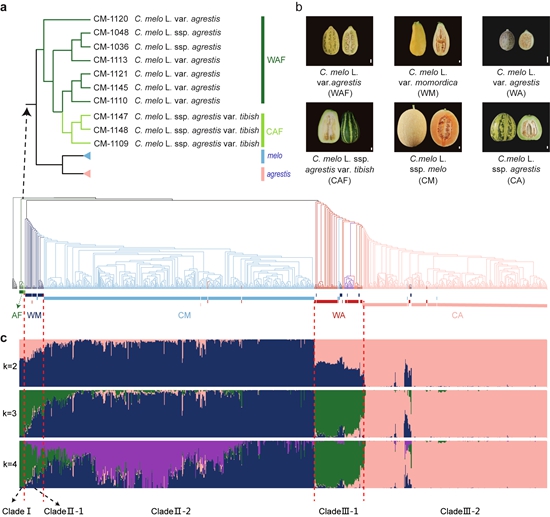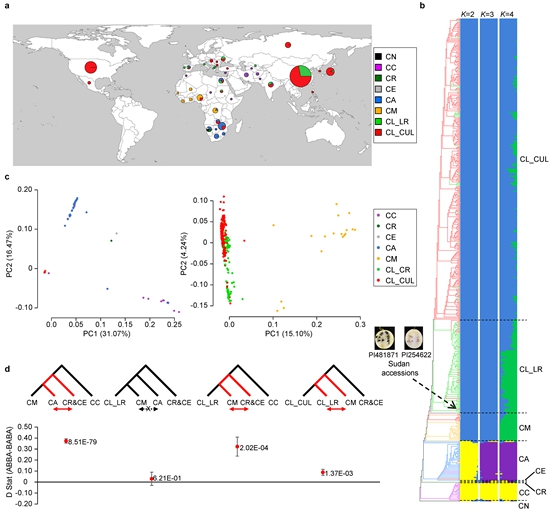The domestication history of melon and watermelon genome revealed for the first time
On November 2nd, two research articles about the history of domestication of melon and watermelon were respectively published on line in Nature Genetics. The researches respectively reported a comprehensive map of the genome variation in melon and watermelon and revealed their domestication history and genetic and molecular mechanisms of fruit quality. The study provide a large number of genetic resources and selection tools for molecular breeding of melon and watermelon, which provides important scientific and practical value in the field of genomics and molecular breeding of melon and watermelon crops.

population structure of melon
For melon, Scientists analyzed the genomic variation of more than a thousand melon germplasm resources and identified a total of 5.6 million SNPs. The results suggest that three independent domestication events occurred in melon, one in Africa. The other two occurred in Asia and produced two subspecies melo and agrestis. Three independent domestication were the same to result in the loss of bitterness and sourness and harvest of sweetness of wild melon. Genome-wide association studies for 16 agronomic traits identified 208 loci significantly associated with fruit mass, quality and morphological characters. This study sheds light on the domestication history of melon and provides a valuable resource for genomics-assisted breeding of this important crop. Prof. Yongyang Xu(Zhengzhou Fruit Research Institute, Chinese Academy of Agricultural Sciences), Prof. Sanwen Huang(Agricultural Genomics Institute at Shenzhen, Chinese Academy of Agricultural Sciences) and Prof. Jordi Garcia-Mas(Centre for Research in Agricultural Genomics CSIC-IRTA-UAB-UB) are the corresponding authors.

population structure of watermelon
For watermelon, Scientists improved watermelon reference genome ‘97103’using PacBio long reads, combined with BioNano optical and Hi-C chromatin interaction maps. 414 accessions were selected for genome resequencing, and about 20 million SNPs were identified. Population genomic analyses revealed the evolutionary history and relationship of seven extant watermelon species, suggesting independent evolutions in Citrullus amarus and the lineage containing Citrullus lanatus and Citrullus mucosospermus. Genomic traces of resistance improvement using wild watermelons were also found. In addition, 43 signal sites associated with fruit sugar content, color, shape and other traits were identified, providing key candidate genes. Prof. Yong Xu(Beijing Academy of Agricultural and Forestry Sciences), Prof. Wenge Liu(Zhengzhou Fruit Research Institute, Chinese Academy of Agricultural Sciences), Prof. Zhangjun Fei(Boyce Thompson Institute for Plant Research, Cornell University) and Prof. Sanwen Huang(Agricultural Genomics Institute at Shenzhen, Chinese Academy of Agricultural Sciences) are the corresponding authors.
The above two studies are the result of collaborative innovation between the Zhengzhou Fruit Research Institute,CAAS and the Shenzhen Agricultural Genomics Institute, CAAS. The work was supported by funding from the Agricultural Science and Technology Innovation Program (ASTIP), the China Agriculture Research System, National Natural Science Foundation of China, the Science and Technology Program of Guangdong the National Key R&D Program of China.
The URL for articles:
https://www.nature.com/articles/s41588-019-0522-8
https://www.nature.com/articles/s41588-019-0518-4
By Zhao Guangwei (zhaoguangwei@caas.cn) / Zhaoshengjie (zhaoshengjie@caas.cn)
-
 Apr 18, 2024Opening Ceremony of the Training Workshop on Wheat Head Scab Resistance Breeding and Pest Control in Africa Held in CAAS
Apr 18, 2024Opening Ceremony of the Training Workshop on Wheat Head Scab Resistance Breeding and Pest Control in Africa Held in CAAS -
 Apr 03, 2024IPPCAAS Co-organized the Training Workshop on Management and Application of Biopesticides in Nepal
Apr 03, 2024IPPCAAS Co-organized the Training Workshop on Management and Application of Biopesticides in Nepal -
 Mar 28, 2024Delegation from the School of Agriculture and Food Science of University College Dublin, Ireland Visit to IAS, CAAS
Mar 28, 2024Delegation from the School of Agriculture and Food Science of University College Dublin, Ireland Visit to IAS, CAAS -
 Mar 25, 2024Director of World Food Prize Foundation visited GSCAAS
Mar 25, 2024Director of World Food Prize Foundation visited GSCAAS -
 Mar 20, 2024Institute of Crop Sciences (ICS) and Syngenta Group Global Seeds Advance Collaborative Research in the Seed Industry
Mar 20, 2024Institute of Crop Sciences (ICS) and Syngenta Group Global Seeds Advance Collaborative Research in the Seed Industry
